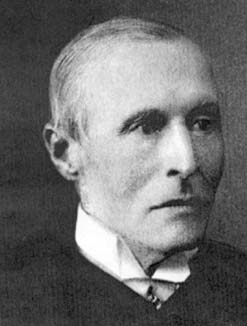
James Cockle
 المؤلف:
Biography by T A B Corley and A J Crilly
المؤلف:
Biography by T A B Corley and A J Crilly
 المصدر:
Dictionary of National Biography
المصدر:
Dictionary of National Biography
 الجزء والصفحة:
...
الجزء والصفحة:
...
 23-10-2016
23-10-2016
 559
559
Born: 14 January 1819 in Great Oakley, Essex, England
Died: 27 January 1895 in Bayswater, London, England

James Cockle's father, also named James Cockle, was a doctor who both treated patients and manufactured his own medicine to sell. James (senior) married Elizabeth (whose maiden name was probably Moss) in 1814; they had five sons and one daughter. The family moved from Great Oakley to London when James, the subject of this biography, was still a child. James entered Stormond House, Kensington in 1825 and was educated there until 1829 when he attended Charterhouse as a day pupil for two years. From 1831 to 1836 he attended a private school in Ramsgate where his talent for mathematics became apparent.
After completing his school education in 1836 he spent a year travelling in the West Indies, Cuba, and America. On 18 October 1837 he entered Trinity College, Cambridge where he took the mathematical tripos. Many intending to enter the legal profession studied mathematics at this time and indeed Cockle began his legal training at the Middle Temple in 1838. He was ranked 33 on the mathematical tripos of 1841 and graduated with a B.A. in the following year. Despite the relatively low position in the tripos, Cockle had demonstrated his mathematical abilities by having a paper published while still an undergraduate. Cockle was called to the bar in November 1846 and, although a barrister by profession, he maintained his interest in mathematics.
Cockle married Adelaide Catharine Wilkin on 22 August 1855; they had nine children. His legal career continued to flourish and he was appointed chief justice for Queensland, Australia, in 1863. His effort there in difficult circumstances were quite outstanding. The chief justice said [3]:-
I have had much knowledge of judicial men, and I am sure the Queen has never had a servant who more thoroughly earned every farthing of the wages he hoped to receive ...
For his efforts in Australia, then of course a British Colony, Cockle was knighted in 1869. He remained in Queensland until 1878, when he returned to England. He was supposed to spend a year in England, then return to Queensland, and indeed the people of Queensland were keen to see him return. However he resigned his post, deciding to retire and spend his retirement in England.
Despite the positions of high authority that Cockle held, he was remarkably productive as a mathematician publishing over 100 papers. He wrote papers on both pure and applied mathematics, as well as on the history of science. On the former topic he wrote on fluid dynamics and magnetism. Most of his work, however, was in pure mathematics where he studied algebra, the theory of equations, and differential equations. He had a collaborator on mathematical work, a Congregationalist minister named Robert Harley. Harley is the author of the articles [3] and [4]. Describing Cockle's contributions to differential equations Harley explained that his [4]:-
... mode of dealing with the theory of differential equations was marked by originality and independence of mind.
Cockle joined the Royal Astronomical Society in 1854, the Cambridge Philosophical Society in 1856, and the London Mathematical Society in 1870. He served as president of the London Mathematical Society from 1886 to 1888. Much earlier, in 1865, he had been honoured with election to the Royal Society of London. After his presidency of the London Mathematical Society, Cockle became a member of the Council of the Royal Astronomical Society, serving in this role from 1888 to 1892. Given the office he had held in Australia one would have expected him to take a leading role in many of the discussions. However [5]:-
On committees or councils he was singularly reticent, rarely venturing a suggestion unless appealed to, but the regularity of his attendance testified to the keen interest he took in the management of business.
After a brief illness, Cockle died at his home in St Stephen's Road, Bayswater. He was buried at Paddington cemetery.
- Biography by T A B Corley and A J Crilly, in Dictionary of National Biography (Oxford, 2004).
Articles:
- A R Forsyth, James Cockle, Proc. London Math. Soc. 26 (1895), 551-554.
- R Harley, James Cockle, Memoirs of the Literary and Philosophical Society of Manchester 9 (1895), 215-228.
- R Harley, James Cockle, Proc. Roy. Soc. London 59 (1895-6), xxx-xxxix.
- Monthly Notices of the Royal Astronomical Society 55 (1894-5), 192.
- E N Marks, Sir James Cockle, Australian Dictionary of Biography 3 (Melbourne University Press, 1993).
 الاكثر قراءة في 1800to1819
الاكثر قراءة في 1800to1819
 اخر الاخبار
اخر الاخبار
اخبار العتبة العباسية المقدسة


